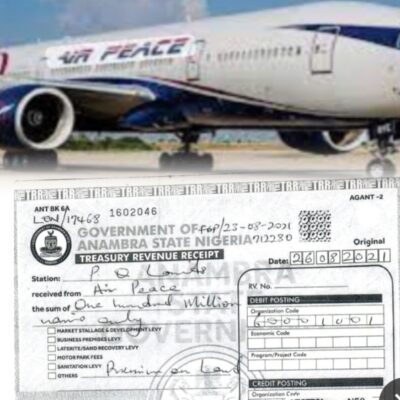
BY OLAPEJU OLUBI
The Nigeria Civil Aviation Authority (NCAA), in partnership with Lufthansa Airlines, has reiterated its strong commitment to advancing sustainability in the aviation industry.
The dedication was firmly highlighted at an Exclusive Discourse Event hosted by Lufthansa Airlines at the Radisson Blu Anchorage Hotel, Victoria Island, Lagos.
At the event, Mrs. Olayinka Babaoye-Iriobe, Director of Air Transport Regulations at NCAA, was represented by Mrs. Evelyn Tanko, Deputy General Manager (Commercial Agreement & Aviation Environment).
Tanko highlighted the NCAA’s regulatory authority under the Civil Aviation Act of 2022, which empowers the agency to address environmental concerns in the sector.
She further emphasized the NCAA’s efforts in supporting sustainability, noting that the authority has incorporated the ICAO Annex 16 on Environmental Protection into the country’s national regulations.
These regulations, found in Part 16 of the Nigerian Civil Aviation Regulations (Nig. CARS), focus on CO2 emissions monitoring, reporting, and verification for international aviation.
Additionally, Part 5 governs aircraft noise and emissions certification.
In her address, Mrs. Tanko pointed out several key initiatives led by the NCAA aimed at ensuring the long-term sustainability of the aviation sector.
These initiatives include the creation of a State Action Plan to reduce CO2 emissions from international aviation, Nigeria’s voluntary participation in the Carbon Offsetting and Reduction Scheme for International Aviation (CORSIA) since its pilot phase in 2018, and the consistent submission of CO2 emissions data by Nigerian airlines.
The NCAA is also spearheading a Sustainable Aviation Fuels (SAF) Roadmap to facilitate the development and widespread use of SAF in Nigeria.
Furthermore, Mrs. Tanko highlighted the proactive steps being taken by other aviation stakeholders.
The Federal Airports Authority of Nigeria (FAAN) is implementing the Airport Carbon Accreditation (ACA) program at key airports, aimed at reducing carbon emissions.
Additionally, the Nigerian Airspace Management Agency (NAMA) has introduced Free Route Airspace (FRA) and Performance-Based Navigation (PBN) systems, both of which contribute significantly to lowering the sector’s carbon footprint.
While these efforts are commendable, Mrs. Tanko acknowledged that challenges remain in the pursuit of greater sustainability.
These challenges include fragmented policy frameworks, insufficient data and monitoring systems, limited financial resources, capacity gaps within regulatory institutions, and a general lack of industry-wide awareness and preparedness.
Speaking on the panel, Mr. Rene Koinzack, Senior Director (Sales) for Lufthansa Sub-Sahara Africa, shared the airline’s commitment to sustainability through its Science-Based Target Initiatives (SBTI).
Lufthansa has deployed a modern fleet, optimized flight operations, achieved carbon-neutral flying, and is utilizing sustainable aviation fuel, all while reducing waste and plastics.
These efforts are integral to the airline’s mission to foster a more sustainable aviation ecosystem.
The meeting emphasized that sustainability in aviation is a collective responsibility.
Airlines, airports, aircraft manufacturers, and regulators must collaborate to reduce carbon emissions, enhance fuel efficiency, develop alternative energy solutions, and improve operational practices.
Attendees unanimously agreed that by doing so, the industry can ensure its growth while safeguarding the environment for future generations.





